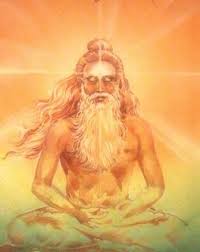Great Throughts Treasury
This site is dedicated to the memory of Dr. Alan William Smolowe who gave birth to the creation of this database.

Patañjali NULL
Indian Philosopher and Compiler of Yoga Sūtras and the Mahābhāṣya, Patañjali is a Sanskrit proper name. Several important Sanskrit works are ascribed to one or more authors of this name, and a great deal of scholarship has been devoted over the last century or so to the issue of disambiguation
"From study and repetition of the Mantras, communion with the desired deity is established."
"From that come swiftness of mind, independence of perception, and mastery over primordial matter."
"From sublimation of this union comes the peaceful flow of unbroken unitive cognition."
"From that is dissolved the covering of light."
"From that no assaults from the pairs of opposites."
"From that is gained introspection and also the disappearance of obstacles."
"From the practice of the component exercises of Yoga, on the destruction of impurity, arises spiritual illumination which develops into awareness of Reality."
"From that there is no disturbance from the dualities."
"From that there is recognition of two similars when that difference cannot be distinguished by class, characteristic or position."
"From the above can be understood the disappearance of sound etc."
"From these only those tendencies are manifested for which the conditions are favorable."
"From this there follows freedom from cause and effect and afflictions."
"God is a particular yet universal indweller, untouched by afflictions, actions, impressions and their results."
"God's voice is Om."
"From them proceed the development of the tendencies which bring about the fruition of actions."
"His designator is `Om'."
"His mastery extends from the finest atom to the greatest infinity."
"Ignorance is taking the non-eternal for the eternal, the impure for the pure, evil for good and non-self as self."
"If cognition of one mind by another (be postulated) we would have to assume cognition of cognitions and confusion of memories also."
"Ignorance is the breeding place for all the others whether they are dormant or attenuated, partially overcome or fully operative."
"Ignorance is the failure to discriminate between the permanent and the impermanent, the pure and the impure, bliss and suffering, the Self and the non-Self."
"In consequence of the mind being colored or not colored by it, an object is known or unknown."
"Improper thoughts and emotions such as those of violence- whether done, caused to be done, or even approved of- indeed, any thought originating in desire, anger or delusion, whether mild medium or intense- do all result in endless pain and misery. Overcome such distractions by pondering on the opposites."
"In effortless relaxation, dwell mentally on the Endless with utter attention."
"In Him is the highest limit of Omniscience."
"In other states there is assimilation (of the Seer) with the modifications (of the mind)."
"In the case of one whose Citta-Vrttis have been almost annihilated, fusion or entire absorption in one another of the cognizer, cognition and cognized is brought about as in the case of a transparent jewel (resting on a colored surface)."
"In God, the seed of omniscience is unsurpassed."
"In the case of one, who is able to maintain a constant state of Vairagya even towards the most exalted state of enlightenment and to exercise the highest kind of discrimination, follows Dharma-Megha-Samadhi."
"In his case the highest stage of Enlightenment is reached by seven stages."
"In the intervals arise other Pratyayas from the force of Samskaras."
"In the case of cognition of one mind by another, we would have to assume cognition of cognition, and there would be confusion of memories."
"In the case of others (Upaya-Pratyaya Yogis) it is preceded by faith, energy, memory and high intelligence necessary for Samadhi."
"In the presence of one firmly established in non-violence, all hostilities cease."
"In this state, it passes beyond the changes of inherent characteristics, properties and the conditional modifications of object or sensory recognition."
"In this way comes mastery over the senses."
"In this way the meditative and the ultra-meditative having the subtle for their objects are also described."
"In this way, that which covers the light is destroyed."
"It (Samadhi) is nearest to those whose desire (for Samadhi) is intensely strong."
"It is important not to abandon the practice [of yoga] because we believe it is driven by the wrong motivation. The practice of yoga itself transforms. Yoga has a magical quality."
"Intuition, which is the entire discriminative knowledge, relates to all objects at all times, and is without succession."
"Isvara is a particular Purusa who is untouched by the afflictions of life, actions and the results and impressions produced by these actions."
"It (Abhyasa) becomes firmly-grounded on being continued for a long time, without interruption and with reverent devotion."
"It is in external, internal or suppressed modification; is regulated by place, time and number, (and becomes progressively) prolonged and subtle."
"It is not possible for the mind to be both the perceived and the perceiver simultaneously."
"It?s (of Samyama) use by stages."
"It is only when the correct practice is followed for a long time, without interruptions and with a quality of positive attitude and eagerness, that it can succeed."
"It may be external, internal, or midway, regulated by time, place, or number, and of brief or long duration."
"Its cause is the lack of awareness of his Real nature."
"Its constant repetition and meditation on its meaning."